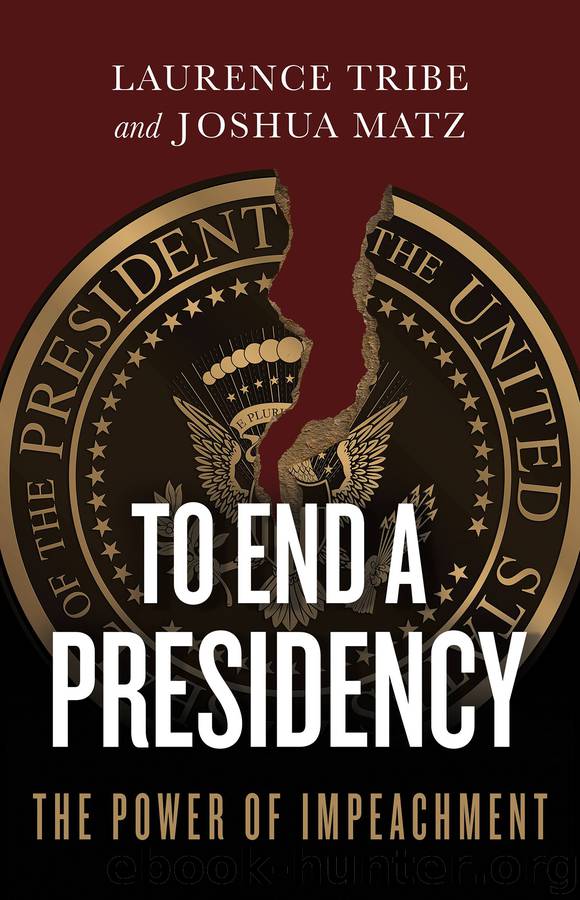To End a Presidency by Laurence Tribe

Author:Laurence Tribe
Language: eng
Format: epub
Publisher: Basic Books
Published: 2018-05-22T04:00:00+00:00
In structuring impeachment proceedings, the Senate has virtually unbounded discretion. The Senate’s “sole Power to try all Impeachments” thus includes the authority to redefine or eliminate almost every standard feature of a judicial trial.
This issue arose in Clinton’s case. From day one, it was clear that the House managers could never convince sixty-seven senators to convict the president. Dreading the prospect of a full-blown trial, Senate leaders spent weeks debating an alternative associated with Senators Slade Gorton (Republican) and Joseph Lieberman (Democrat). Under this creative proposal, the Senate would hold a preliminary vote after hearing opening statements. If none of the articles received two-thirds approval—a foregone conclusion—then the Senate would end proceedings right away, without hearing testimony or further argument. At first, the Gorton- Lieberman proposal commanded strong support. And when the plan ultimately collapsed, it did so not because of any legal defect but because outraged House Republicans browbeat their Senate colleagues into allowing a broader presentation.
Here we encounter one of impeachment’s most striking oddities. The Senate must “try all Impeachments.” But its proceedings needn’t be anything like judicial trials, which have been refined over centuries to achieve fairness, accuracy, efficiency, and many other goals. The Senate itself must decide whether and to what extent the strictures of the Due Process Clause even apply to impeachment trials. More broadly, the Senate must decide what it means to “try” an impeachment, knowing it’s almost unimaginable that the Supreme Court would review any decisions it makes. Thus, as attorney Russell Spivak has remarked, “the rules… are governed by the whims of the 100 men and women with offices in the Dirksen, Hart or Russell buildings.”43 While senators agreed in Clinton’s case to use a general procedural framework first designed for Johnson’s trial, they exercised creativity and discretion where those rules didn’t squarely address the question at hand.
Gorton-Lieberman was an especially extreme example of how the Senate might reimagine a trial. Now let’s consider something more pedestrian. Under most circumstances, judges neither collaborate nor communicate off the record with parties appearing before them. Doing so would normally be regarded as fatal to the integrity of the proceedings. But these rules don’t necessarily apply to impeachment trials. During Clinton’s case, for example, Republican senators regularly huddled with the managers (and their allies in the House). Democratic senators, in turn, kept in frequent contact with the president’s team to plan strategy. Some senators even turned double agent. According to Clinton, “one Republican senator who was opposed to impeachment kept us informed of what was going on among his colleagues.”44 The relentless swirl of innuendo around Washington, DC, meant that the Senate simultaneously plotted with parties and judged their case.
A related anomaly in Clinton’s trial was the absence of a gag rule, which later led Judge Richard Posner to denounce the proceedings as “a travesty of legal justice.”45 In a normal case, the judge waits until the end to announce the ruling. Not here. Before and throughout the Clinton trial, many senators took strong public positions on the ultimate issue of conviction.
Download
This site does not store any files on its server. We only index and link to content provided by other sites. Please contact the content providers to delete copyright contents if any and email us, we'll remove relevant links or contents immediately.
Day by Elie Wiesel(2778)
The Age of Genius by A. C. Grayling(2571)
Gideon's Spies: The Secret History of the Mossad by Gordon Thomas(2331)
The Gulag Archipelago (Vintage Classics) by Aleksandr Solzhenitsyn(2082)
FATWA: Hunted in America by Pamela Geller(1996)
Columbine by Dave Cullen(1862)
Men Explain Things to Me by Rebecca Solnit(1719)
The Rule of Law by Bingham Tom(1679)
Anatomy of Injustice by Raymond Bonner(1656)
Examples & Explanations: Administrative Law by William F. Funk & Richard H. Seamon(1631)
Three Cups of Tea by Greg Mortenson(1608)
The Source by James A. Michener(1601)
That Every Man Be Armed by Stephen P. Halbrook(1575)
ADHD on Trial by Michael Gordon(1569)
Future Design by Unknown(1565)
Gideon's Spies by Gordon Thomas(1498)
Palestinian Walks by Raja Shehadeh(1494)
Constitutional Theory by Carl Schmitt(1448)
Nothing to Envy by Barbara Demick(1443)
